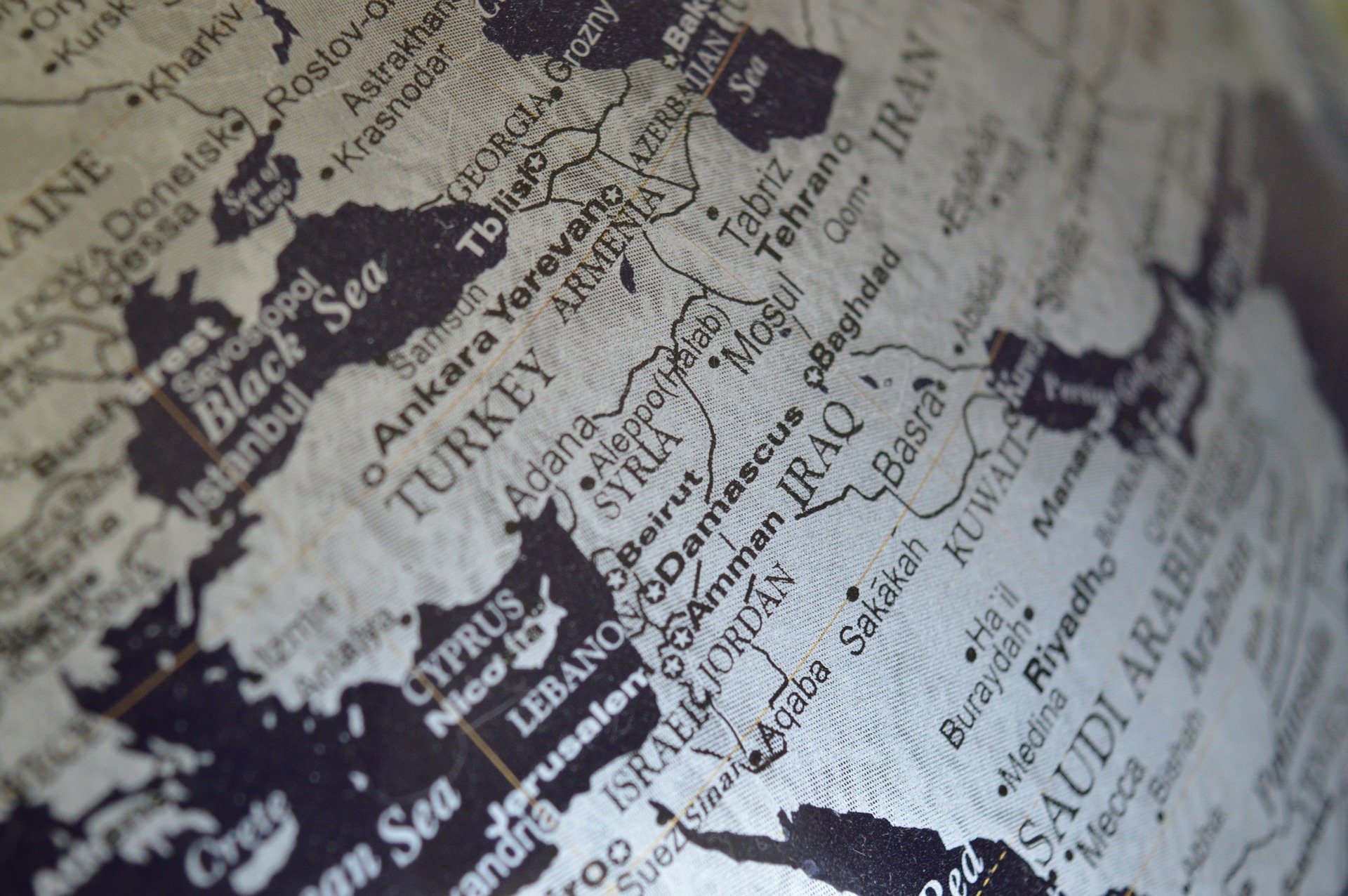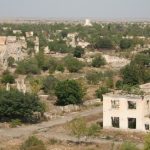
U.S. WEEKLY offers an in-depth analysis of various geopolitical processes that have direct effect on US’ domestic and foreign policies. This particular analytical column is possible thanks to the cooperation with polish media abroad: Dziennik Związkowy – Polish Daily News, Polishexpress of United Kingdom and WIrlandii.pl of Ireland
Date: 2 November 2020
Author: Maciej Śmigiel
The Dynamics of International Relations in the Middle East
The complicated and constantly changing networks of arrangements, alliances and conflicts, in which significant parties often include non-state actors, are a characteristic feature of the geopolitical scene in the Middle East. The relations between individual countries, religious, paramilitary and terrorist organizations in addition to overseas powers can confuse even skilled observers, let alone laypeople. Nevertheless, it is worth noting some basic characteristics that shape the reality of the Middle East nowadays.

Speaking (or writing) about this region one cannot forget the reason behind its significance. The energy resources, especially crude oil, are the most commonly associated with this area. It is quite obvious, yet still worth mentioning. Oil, along with a strategic location at the intersection of the three continents and multiple trade routes, is the main reason why the world powers are interested in the Middle East and compete with each other trying to increase their local influence.
The 20th century history of the region was defined primarily by events such as the collapse of the Ottoman Empire, the interventions of colonial powers, the establishment of the State of Israel and the 1979 Iranian Revolution. Of course, the Cold War, taking place in the second half of the previous century, was also a significant event that influenced the balance of power in the Middle East. At this point it is worth mentioning the periphery of the region, Afghanistan, where the civil war, the Soviet intervention between 1979 and 1989 as well as the US support for anti-communist fighters, consequently led to the establishment of al-Qaeda, until recently the most famous fundamentalist terrorist organization, and the so-called internationalization of jihad, which in turn initiated the “war on terror.”
The 20th century therefore abounded in turning points, which to this day are more or less important and cannot be omitted when trying to analyze the contemporary problems of the Middle East and the ongoing developments. The aforementioned events, constituting sort of caesuras, resulted in subsequent ones, which over time have been piling up and permeating each other, similarly to the involved parties. The 21st century brought us further breakthroughs, the first of which was the Second Gulf War, better known as the Iraq War, which destabilized the region and created fertile ground for the future establishment of the so-called Islamic State. The next moment was a series of protests and revolutions in 2011, referred to as “the Arab Spring” or “the Arab Winter.”
So much for the history in a general form. In an attempt to explain today’s dynamics affecting the image of the Middle East, numerous additional, yet essential threads could be mentioned and thoroughly explained, all of them being significant in their own way. It appears as follows: in September two more countries – the United Arab Emirates (UAE) and Bahrain, established official diplomatic relations with Israel. This event is a landmark in a broader process of growing acceptance of Arab states for Israel, (unofficially) at the cost of the Palestinian cause, in order to create a united front against other regional rivals – Turkey and Iran. Furthermore, this process includes additional seemingly insignificant events, such as the fact that the largest English-language newspaper in Saudi Arabia – Arab News, expressed its wishes on the occasion of the Jewish Rosh Hashanah (New Year’s Day) on September 18, changing its profile pictures on the social media to the wishes written in Hebrew, thus causing much controversy. However, this confirmed the belief that although Saudi Arabia cannot afford to establish official diplomatic relations with Israel, it will look favorably on such actions in the case of other Arab countries and quietly support them, at the same time limiting itself to such gestures.
As an example of the “normalization” of contacts, or more of an announcement of such in the future, some pointed to the Israeli-Lebanese negotiations on the maritime border, which began on October 12. US Secretary of State Mike Pompeo called them “historic” (Israel and Lebanon are officially at war), however, the President of Lebanon Michel Aoun has toned down this enthusiasm by declaring that indirect talks will be limited to technical matters and no major normalization will take place in the near future. Nonetheless, the question remains whether Lebanon will not be forced to do so due to deteriorating economic situation and the need to find new economic partners. The country, once called “Switzerland of the Middle East,” has been struggling for years with not only an economic and financial crisis, but also a social and political one, aggravated by the explosion in the port of Beirut on August 4. The question is whether Lebanon would use this opportunity to potentially improve the situation and establish diplomatic relations with Israel or not.
Support Us
If content prepared by Warsaw Institute team is useful for you, please support our actions. Donations from private persons are necessary for the continuation of our mission.
The process of redefining Israeli-Arab relations is one of the main subjects that characterizes the contemporary dynamics of the Middle East agreements, yet it is not a cause, but an effect of other processes. For the main representatives of the Arab allies of the United States, i.e. Egypt, Saudi Arabia and the United Arab Emirates, the key rivals are Turkey and Iran. While in the case of Iran we are dealing with a long-standing hostility, sometimes religiously motivated (Shiite Iran versus Sunni states), creating an openly anti-Turkish front is a kind of novelty. Egypt is at the forefront of this rhetoric. On September 9th the head of Egyptian diplomacy Sameh Shoukry called on the Arab countries to adopt a “firm and unanimous” policy against Turkey. This took place the day before a special meeting of the Foreign Ministers of the Arab League during which Turkish interventions in Syria, Libya and Iraq were condemned.
Egypt is not the only Arab state trying to counter Turkish influence in the region, but it is undoubtedly doing so most fiercely, being almost at war with Ankara. In this case, the main bone of contention has recently been Libya, where Cairo supports the forces of General Khalifa Haftar and the so-called National Liberation Army, representing the government in Tobruk in the civil war. On the other hand, Turkey is aiding the government in Tripoli (the Government of National Accord, or the GNA), which is officially recognized internationally, including the League of Arab States. However, Cairo fears that the victory of the other side would make Libya a haven for various kinds of extremists. And since this country is adjacent to Egypt, such a situation would, in the opinion of Egyptian decision-makers, pose a direct threat to the internal security of the country over the Nile.
The roots of tensions between Cairo and Ankara, including those in the context of Libya, go back to 2013 and the military coup in Egypt. It resulted in the overthrow of President Mohamed Morsi, associated with the Muslim Brotherhood. He was appointed after the elections following the events of the 2011 Arab Spring and the loss of power by Hosni Mubarak. The former general and leader of the coup, who launched a nationwide campaign against the Brotherhood after recognizing it as an extremist organization – Abdel Fattah al-Sisi – became the President. The coup was condemned by Turkey and its President Recep Tayyip Erdoğan, who, in addition to his personal aversion to military coups overthrowing extremally “Islamic” governments, saw Morsi as an ally. Since then, he has called al-Sisi a dictator and tyrant, but al-Sisi in addition to regarding the Turkish president in a similar manner, accuses him of supporting extremists, such as the Muslim Brotherhood, and trying to destabilize the region, including Libya. Recently, Saudi Arabia and the UAE have also been increasingly using an anti-Turkish tone. For example, on October 3, the president of the Saudi Chamber of Commerce Ajlan al-Ajlan called the citizens of the kingdom via Twitter for “a boycott of everything Turkish.” On October 10, Anwar Gargash, Minister of State for Foreign Affairs of the UAE, concluded that the Turkish military presence in Qatar “reinforces polarization, and it does not take into account the sovereignty of states and the interests of the Gulf countries and its peoples.” These are only the latest statements made by Saudi and UAE officials against Turkey.
Today, the Middle East can be simplified as follows: on the one hand there is Israel and the Sunni Arab states which maintain good relations with the United States; on the other hand, Turkey, Qatar and the Muslim Brotherhood; additionally there is Iran and its allies (Hezbollah, the Shiite militia in Iraq, the Syrian government) which have not been mentioned in detail here. The rivalry between them is taking place in Libya, Syria, Iraq and Yemen, whilst the already confusing network of agreements and interests should be supplemented with other countries outside of the region (the USA, Russia, China, France). Nevertheless, it could be expected that for at least the next few years the dynamics of international relations in the Middle East will follow this triaxial pattern. It certainly poses a threat to the integrity of NATO since Turkey’s ambitions are often contrary to the interests of the other members of the alliance. The question is how other countries in the region will adapt to this arrangement: the aforementioned first group of them would appreciate having a united Arab front, and it often relies on “Arabism” as opposed to “Turkishness” and “Persianism.” Here, above all, the future role of Oman and Kuwait is intriguing. In the past, these countries have repeatedly assumed the role of mediators, but now, after the power shift in both countries (the death of Sultan Qaboos in January and Emir al-Sabah at the end of September), the new leaders may not be as strong as their predecessors. However, the results of the US presidential election and the policy of the next American administration will be crucial for the Middle East power structure.
All texts published by the Warsaw Institute Foundation may be disseminated on the condition that their origin is credited. Images may not be used without permission.

















